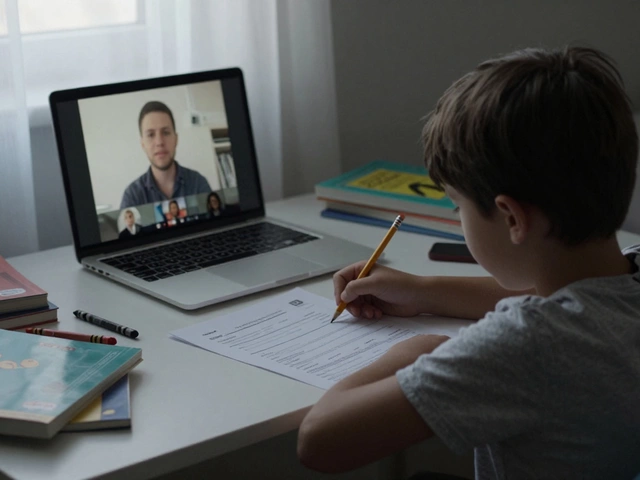So, you've probably wondered if people with special needs should have kids. It's a loaded question and one that dives into all sorts of challenges and joys. For many, the idea is wrapped up in societal views, personal desires, and sometimes, a heap of stereotypes that just don't hold water.
Think about it: anyone considering having kids needs to weigh their resources, support systems, and personal readiness. Now, layer in a disability, and you've got a whole new set of factors to chew over. But don’t let this be a downer. Parents with special needs bring unique perspectives and skills to the table that, frankly, make family life pretty interesting.
Let's break down some of the biggies involved in this decision. From navigating the legal maze to finding the right support and sharing personal stories, there's a bunch to consider. Understanding these layers not only empowers prospective parents but also helps dismantle misconceptions.
- Understanding the Decision
- Societal Stereotypes and Myths
- Legal and Financial Considerations
- Support Systems Available
- Personal Stories from the Community
- Tips for Navigating Parenthood
Understanding the Decision
Choosing to have kids is a massive life decision for anyone. For people with special needs, this decision involves weighing some extra factors. Let's be real: there’s no magic formula here, but understanding the landscape can make the journey smoother.
First off, it’s crucial to get a handle on personal capabilities and limitations. This isn’t about focusing on what might be hard, but about figuring out what resources you'll need. Have you thought about how your disability might affect parenting tasks? This isn't to say it can't be done, but understanding this is a part of the process.
It's also key to think about potential impacts on your health and lifestyle. Engaging resources like self-help groups or seeking advice from healthcare professionals who specialize in disabilities can provide clarity here. Remember, knowledge is power!
Financial aspects are another biggie. Can you afford the costs of raising a child? And if you’re already getting disability benefits, how will having kids affect that? Some organizations provide insights into managing finances with a family, even if you’re living with a disability status.
Another thing worth digging into is asking family and friends about their experiences. Often, firsthand stories can provide insights that you won’t find in official reports or guides. If you have access, chatting with a support group can be a goldmine of relatable advice and encouragement.
Bottom line: while the decision to have kids as someone with special needs comes with its own set of considerations, it’s absolutely a road many have traveled successfully. Being informed, prepared, and supported makes all the difference.
Societal Stereotypes and Myths
When it comes to the topic of people with special needs having kids, societal stereotypes can be a real buzzkill. There's this outdated notion that if you have a disability, you're automatically less capable of being a parent. But, let's be real—this is more stereotype than truth.
A common myth is that parents with disabilities can't provide a 'normal' upbringing for their children. But what does 'normal' even mean? Many parents with unique needs raise happy and well-adjusted kids, proving that parenting capabilities aren't one-size-fits-all.
Another misconception floating around is that the children of parents with disabilities will inevitably face hardships or take on unfair responsibilities. Sure, they might face unique challenges, but they also gain empathy, resilience, and a broader perspective on the world.
There's also this assumption that having a disability automatically precludes someone from navigating the ins and outs of parenthood. This ignores the reality that tons of parents, regardless of ability, need help, whether it's from family, friends, or community resources.
So, why do these stereotypes stick around in 2025? Lack of awareness and visibility are big culprits. People with special needs are often underrepresented in media and discussions about parenting. Changing the narrative starts with sharing more real stories and facts about the capabilities and accomplishments of these parents.
Legal and Financial Considerations
Getting into the nitty-gritty of the legal and financial stuff might sound like a snooze, but it’s actually crucial when thinking about having kids, especially for people with special needs. First off, rights and protections are everywhere in laws like the Americans with Disabilities Act (ADA) and the Family and Medical Leave Act (FMLA). These laws help ensure fair treatment and can relate to areas like employment and accessing services.
On the money side, budgeting is key. Raising a child is costly for anyone, and it might require some extra financial planning for families with disabilities. Fortunately, there are some helpful programs out there. Programs like Supplemental Security Income (SSI) and Medicaid can assist families with low incomes. Plus, if a parent with a disability is working, they might be eligible for certain tax breaks or credits.
Also, let’s not gloss over estate planning. It's not just for the rich—it's important for peace of mind, too. Consider creating a trust or will to ensure kids are taken care of financially in the future, regardless of your current situation.
Here’s a little nugget of info to keep in your back pocket: about 30% of families with special needs encounter increased medical expenses, according to various surveys. Tackling these with a well-thought-out plan can make a massive difference in stability and peace of mind.
It’s a lot to digest, but taking the time to understand these aspects can truly empower parents with disabilities and ease some of the stress of raising a family.

Support Systems Available
When people with special needs become parents, leaning on support systems isn't just helpful—it's essential. You'll find there's a huge range of services out there designed to make parenting a bit smoother.
First off, community organizations are a goldmine. Many local groups offer resources and activities tailored for parents with disabilities. These can include parenting classes, peer support groups, and even family-friendly events where you connect with others in the same boat.
Next, governmental programs can be a real game-changer. In many places, services such as Medicaid provide essential healthcare, and programs like Social Security can offer financial help. Don’t forget that the ADA (Americans with Disabilities Act) exists to protect your rights as a parent and ensure you have access to the resources you need.
Educational institutions sometimes offer family support, too. Many schools have programs for children with special needs, and some even offer support for parents, providing learning opportunities and emotional aid. It's worth chatting with your kid's school to see what's on offer.
Don't overlook online communities either. The internet is buzzing with forums, social media groups, and websites dedicated to parenting with special needs. These spaces offer a platform to share experiences, gather advice, and find virtual camaraderie.
Let's not ignore tech solutions. Apps and adaptive devices have come a long way in supporting parents. From apps that help manage daily tasks to gadgets that assist with childcare, technology can be a reliable ally.
If you're curious about who gets what kind of assistance, here's a simple breakdown:
| Type of Support | What's Offered |
|---|---|
| Community Organizations | Classes, events, peer support |
| Government Programs | Healthcare, financial aid, legal protections |
| Schools | Special programs, parent resources |
| Online Communities | Advice, support networks, forums |
| Tech Solutions | Apps, adaptive technologies |
All these support systems are like having a toolkit where each tool, whether it's a community group or an app, plays its part in helping parents balance the demands of family life. If this sounds like a lot to navigate, start small—pick one or two avenues that resonate with your needs.
Personal Stories from the Community
When we talk about people with special needs considering parenthood, nothing beats real-life stories to offer insight. Take Sarah and Mike, for instance, who both have cerebral palsy and run an online blog sharing their parenting journey. They’ve faced a slew of skeptics but have shown what love and determination can do. They often mention how they've adapted daily routines to suit their needs, finding creative ways to be active parents.
Then there’s Dave, a brave single dad dealing with visual impairment who raises two toddlers. He's an avid advocate for more inclusive playgrounds. Dave emphasizes using technology like smart speakers and special apps that help navigate parenting tasks—proof that where there’s a will, there’s a way.
Let's not forget Emily and her partner, who have learning disabilities. They're a dynamic duo who’ve turned their story into a platform for disability rights. They highlight how crucial it is to have a solid support system, both emotionally and practically, to help with things they might find challenging—a message that resonates with many.
Interestingly, a small survey conducted by Parenting with Disabilities Network showed that the most common concerns among these parents centered around societal judgment and lack of tailored resources. Yet, 85% of them felt an immense sense of fulfillment in raising their kids, reporting they bring a fresh perspective to parenting tasks and even enjoy the unpredictable nature of the journey.
The takeaway from these stories is clear: having kids while managing disabilities isn't about fitting into society’s typical mold of parenting. It's about carving new paths, finding what works, and celebrating the triumphs, no matter how small. These stories aren't just anecdotes; they're blueprints for what's possible.
Tips for Navigating Parenthood
Diving into parenthood is a challenge for anyone, and for those with special needs, it can feel like a whole new level of adventure. But guess what? Loads of people are doing this and doing it well, while creating happy, healthy families alongside their unique challenges.
First up, lean on technology. There are tons of gadgets, apps, and adaptive equipment designed to make life easier for parents with disabilities. Whether it’s a voice-activated assistant helping to manage schedules or adaptive cribs, these tools can make a big difference.
Building a strong support network is essential. Surround yourself with family, friends, and professionals who understand your needs and are eager to help. Join online communities and local support groups where parents with disabilities share tips and experiences. There's something powerful about connecting with folks who get it.
Master the art of planning. With so many moving parts, having a flexible plan can help keep stress levels down. From childcare arrangements to medical appointments, having a good handle on your schedule is key.
Don't shy away from asking for help. Whether it’s hiring a babysitter who’s familiar with working with parents with disabilities or relying on a family member, it's okay to reach out. You're not in this alone.
- Financial planning is crucial. Know your benefits, any grants available for special needs parenting, and possible tax breaks. A financial advisor familiar with disabilities can offer valuable insights.
- Educate yourself and your partner (if you have one) continuously. There’s always new information, from medical advances to practical parenting tips specific to your special needs scenario.
- Encourage open communication with your child about your disabilities. Kids are curious, and honesty helps them understand and adapt.
A study found that around 15% of parents have some form of disability, and they frequently report high satisfaction with their lives, showing that challenges don’t overshadow the joys of parenting. It's all about finding what works for you and embracing your unique family dynamic.
Remember, there's no one-size-fits-all in raising kids. It's okay to rewrite the rules to fit your situation. Embrace the journey, learn from it, and don’t forget to celebrate the little victories along the way.






